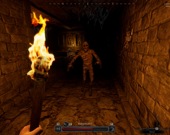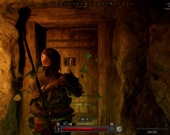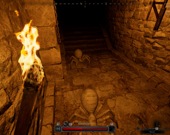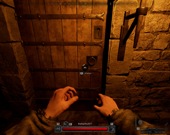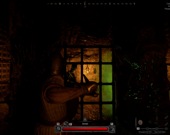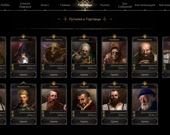Dark and Darker Game Review
This game was in the spotlight after the demo festival on Steam. The public liked the concept: a squad goes down into a dungeon and defeats monsters to collect loot and then get out. But on the same map there are other teams, and the monsters are also on alert, so evacuation, which allows you to save all the trophies, is a difficult task. We saw roughly the same thing in Hunt and Escape from Tarkov, but here it's fantasy at the center - it's no coincidence that when Dark and Darker is abbreviated to D&D (just like Dungeons and Dragons). The fate of the game was hard: first the developers were accused of plagiarism, then forced to leave the store. But recently the gloomy online fighter is back, and it became free of charge - it's high time to try it out.
What is this game about?
Anyone who has ever run Hunt: Showdown or EFT has realized the main problem of such projects - they have a high entry threshold. It's not so hard to understand their rules, but then you have to learn all the maps by heart, hone your shooting skills to perfection, learn to distinguish items by price and avoid ambushes when leaving locations. This is the kind of game they say "easy to learn, hard to master". What do you think Ironmace employees did in this situation? They raised the entry threshold even higher! They added a role-playing system and classes, which can be selected only once on a free account. Don't like the character you've created? Well, then you'll have to pay more. But at the same time Dark and Darker didn't become exorbitantly complicated.
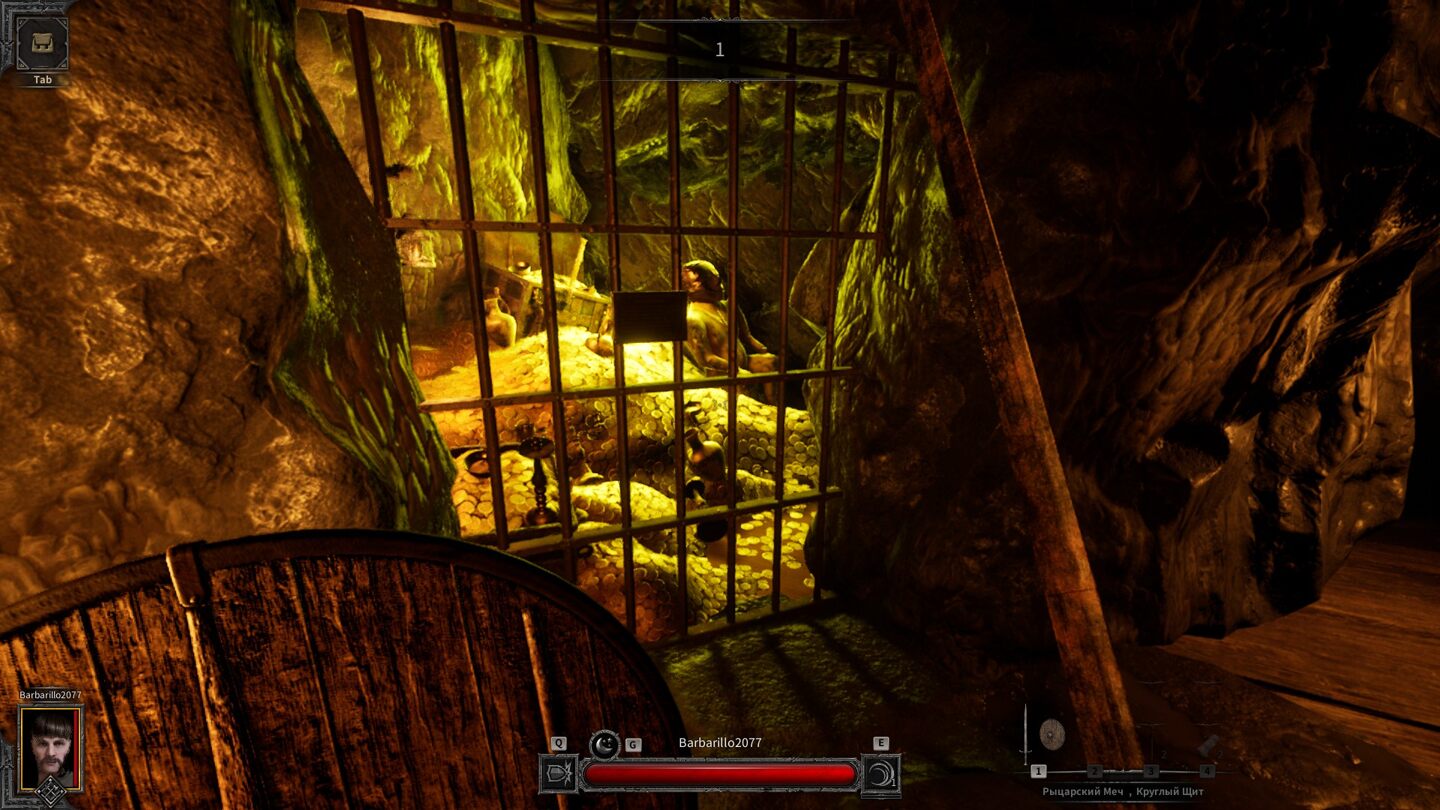
There are currently nine classes in the game. There is a warrior, who can wear any clothes and fight with any weapon, and is also characterized by stamina. But his abilities are purely melee. The barbarian has increased health, damage multiplier and natural resistance to charms, although he is not a mobile hero - you need to keep an eye on him to make sure he doesn't run into a dangerous and skittish opponent. Such as a brigand, for example. This little guy is very fast, and in addition, unlocks chests without the keys and in advance, noticing traps, although he can not boast a powerful physique. The pathfinder hits enemies with a bow, sets traps, tracks the victim - in short, everything is good, except close combat. The wizard, in turn, is weak on all fronts except magic.
If you want not only to cast magic, but also to swing your fists, and to heal yourself and your friends in between, it makes sense to choose a cleric. The bard is a master of rapier fencing, but he makes a lot of noise, so all the undead will come running to you. The Enchanter will be of great use to your squad - he's had his fill of curses and weakening magic, but he spends his own life points on each sorcery, which won't be convenient for everyone. Finally, the druid takes the form of beasts, though he doesn't carry much in his inventory. But it will slip in the form of a rat anywhere. It is worth remembering that each of the heroes has a development tree - it is better to look at the list of skills on the official website, so that you do not regret the choice of character. Developers advise newcomers warrior, cleric or pathfinder. The first one is interesting because of its versatility and simplicity, the second one helps to understand the game, and the third one allows you to avoid close combat.
If you want not only to cast magic, but also to swing your fists, and to heal yourself and your friends in between, it makes sense to choose a cleric. The bard is a master of rapier fencing, but he makes a lot of noise, so all the undead will come running to you. The Enchanter will be of great use to your squad - he's had his fill of curses and weakening magic, but he spends his own life points on each sorcery, which won't be convenient for everyone. Finally, the druid takes the form of beasts, though he doesn't carry much in his inventory. But it will slip in the form of a rat anywhere. It is worth remembering that each of the heroes has a development tree - it is better to look at the list of skills on the official website, so that you do not regret the choice of character. Developers advise newcomers warrior, cleric or pathfinder. The first one is interesting because of its versatility and simplicity, the second one helps to understand the game, and the third one allows you to avoid close combat.
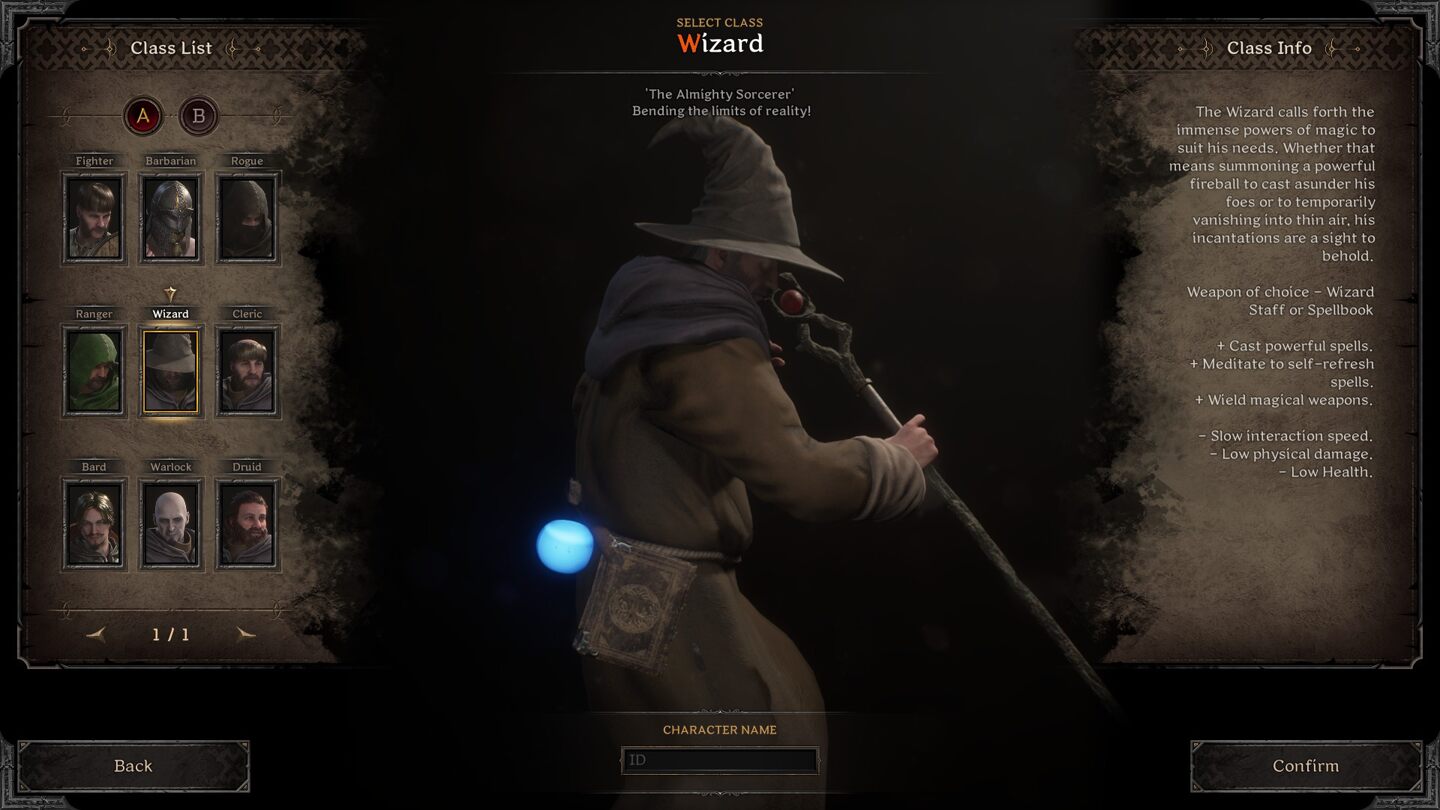
After choosing a hero, you need to decide on the server, map and mode. In fact, there are a lot of locations in the game, but they are in constant rotation - and as a result, only six locations get into the active window: two for solos, duos and trios. Why two each? Because one of this pair is free, and for the other you will have to pay a hundred game coins, because it is the so-called "high roller", that is, the dungeon with the most valuable loot. In addition, you need to try a dozen servers - represented as European, and American and Asian. But not all of them are constantly active, so be patient.
Before the foray it is worth visiting the characters, which in the game thirteen - from the armorer and tanner to the alchemist and tavern keeper. All of them give orders to collect certain items on the map or perform some actions - just like in Escape from Tarkov. You shouldn't be squeamish about these tasks, because if you succeed, you'll get a bonus. Believe me, this reward will come in handy when you lose your equipment after a couple or three unsuccessful matches. There is also a squire among the NPCs - he will share equipment items if you lack something.
Finally, before the fight you should go to the "Perks and Skills" menu, where you can find all the tricks and passive skills your hero is capable of. The thing is that some of these abilities are designed to pass levels alone, while others (for example, the effects imposed on the area) are useful for a squad. They are also different in their effect - the same cleric has three skills related to healing, and the warrior has a choice between an emphasis on defense and emphasis on attack. It is better to think ahead of time, in what style you intend to explore the dungeon.
Before the foray it is worth visiting the characters, which in the game thirteen - from the armorer and tanner to the alchemist and tavern keeper. All of them give orders to collect certain items on the map or perform some actions - just like in Escape from Tarkov. You shouldn't be squeamish about these tasks, because if you succeed, you'll get a bonus. Believe me, this reward will come in handy when you lose your equipment after a couple or three unsuccessful matches. There is also a squire among the NPCs - he will share equipment items if you lack something.
Finally, before the fight you should go to the "Perks and Skills" menu, where you can find all the tricks and passive skills your hero is capable of. The thing is that some of these abilities are designed to pass levels alone, while others (for example, the effects imposed on the area) are useful for a squad. They are also different in their effect - the same cleric has three skills related to healing, and the warrior has a choice between an emphasis on defense and emphasis on attack. It is better to think ahead of time, in what style you intend to explore the dungeon.
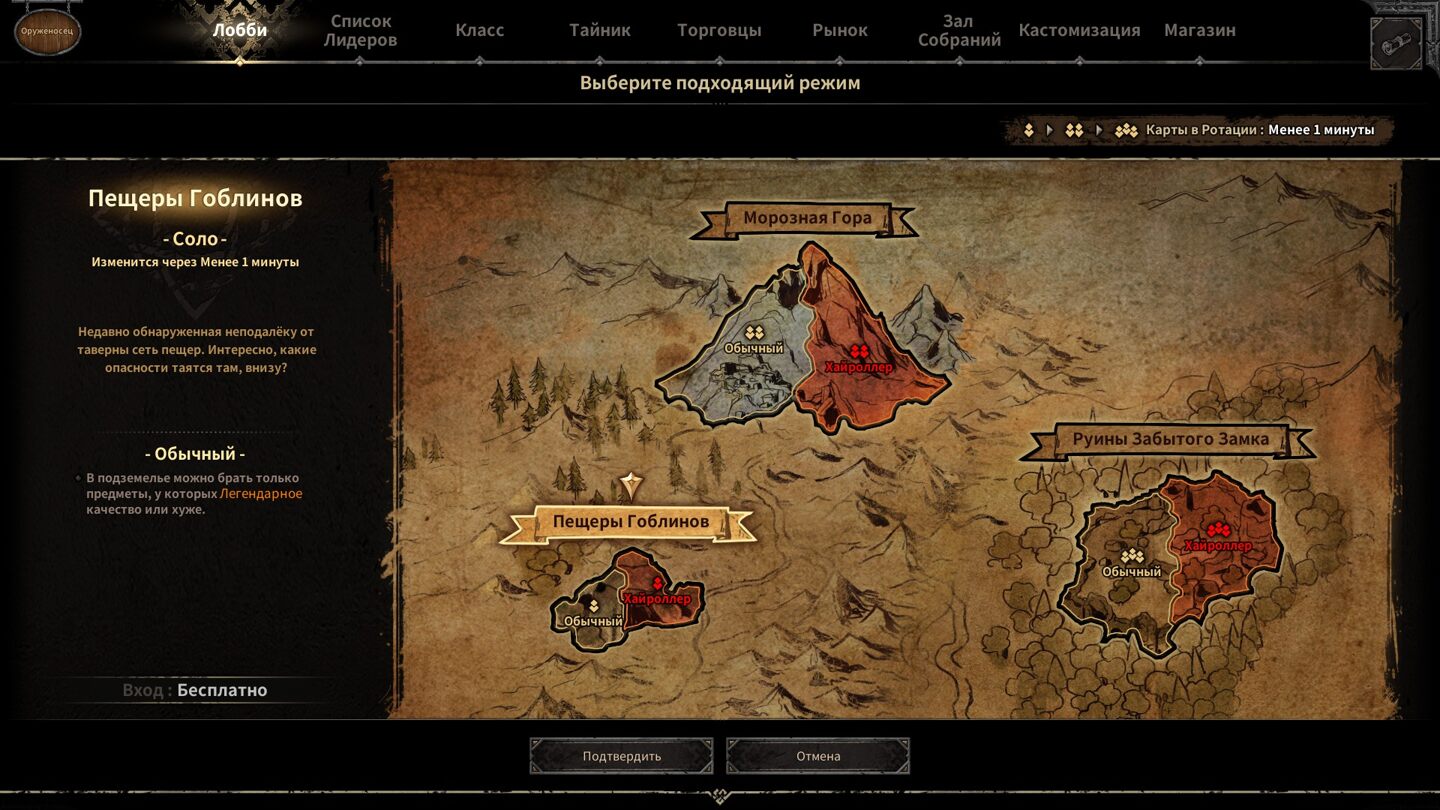
And then the plot from "Indiana Jones" begins: you get into the gloomy catacombs, where sometimes it's so dark that it's as dark as the eye can see, and explore them in search of treasures. But you are much more likely to find trouble, because there is an enemy lurking around every corner, and a harmless-looking chest turns out to be a toothy monster - just like the products of the reasonable pear in Terry Pratchett's books. Even in a quiet alley there is a great risk to fall into someone's trap - sometimes they are placed right inside the bodies of enemies. And the friends in the squad are nominal. Unlike most games of the genre, here any member of the group is free to kill his partners and take all the loot for himself.
If you are lucky enough to fill your bag with trophies and survive, you should move towards the blue portal, which returns the match participants to the lobby. Here Dark and Darker gives you a break in the form of a detailed map, where you can't see the enemies, but all the important objects are shown. Keep in mind that portals have a limited capacity. If you don't get into one, look for the next one. And in the lobby begins the usual "Tarkov" activities: "spotting" with loot in the warehouse, choosing items taken from the task for the next outing, getting rewards for quests.
If you are lucky enough to fill your bag with trophies and survive, you should move towards the blue portal, which returns the match participants to the lobby. Here Dark and Darker gives you a break in the form of a detailed map, where you can't see the enemies, but all the important objects are shown. Keep in mind that portals have a limited capacity. If you don't get into one, look for the next one. And in the lobby begins the usual "Tarkov" activities: "spotting" with loot in the warehouse, choosing items taken from the task for the next outing, getting rewards for quests.
Features of the combat system
The main thing to know about the battles in Dark and Darker is that they are realistic. The view here is first-person, all blows have tempo and inertia, and magic needs to recharge. If you're shooting a bow, for example, the farther away your character is from the enemy, the higher you have to aim. And in the lobby before the match, don't be too keen on warming up. For example, you took 40 arrows with you and decided to stuff a scarecrow in the hall with them for training, but another player ran past and took these arrows for himself - so they will stay with him, you can't take them to the battle map. There are a lot of such nuances in Ironmace's work. Every now and then you miss a blow because of a shield that was not lowered in time or a sword that got stuck in the wall when swinging.
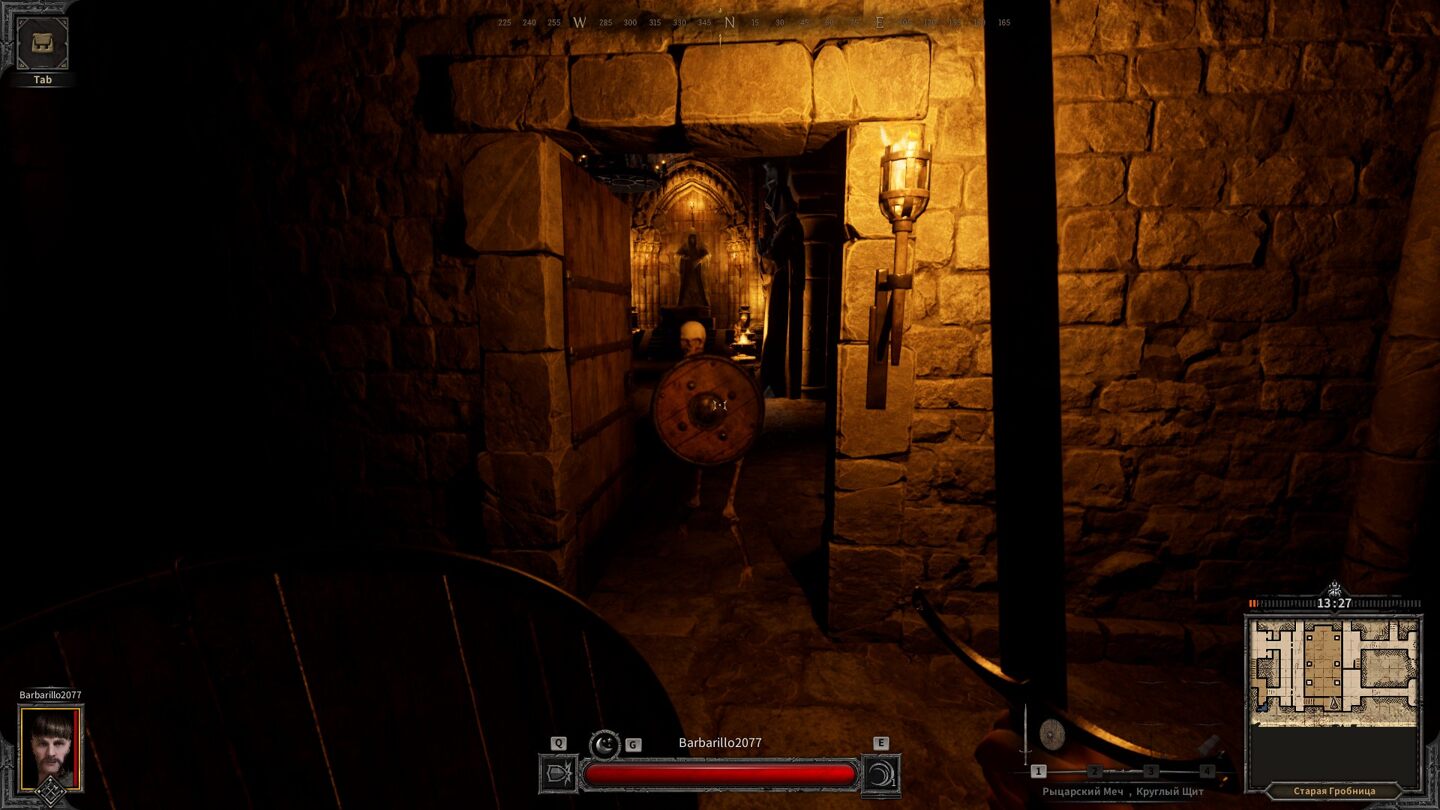
Since there is no tutorial mode (yet), you have to find your tactics on the battlefield by experience. For a warrior - "run up, hit, retreat", for a tracker - "set a trap, shoot, hide". Enemies are painful - they send the hero to the grave with just a few blows. Also in the game does not work the usual settings of "friendly fire". Nothing prevents you from inadvertently injuring or killing a friend, or even stepping on your own trap, forgetting about its location. On the other hand, the complexity is added by the fact that you can accidentally impose a positive effect on the enemy. You wanted, say, to heal your friend's wounds, but you missed a little - and then health points will be added to the zombie that attacks you. Even if the enemy has fallen, a spell cast under your feet (say, a protective dome) can go into it instead of into the living heroes.
But that's not all, because the levels in the game, as already mentioned, are mostly dark. In the inventory of every decent hero, of course, will find a torch. But then choose: sneak around in the dark and armed or see where you are going, but in case of a sudden attack waving away the enemy with a burning piece of wood. You can still crush a spider with five pokes, but hitting a mummy or a skeleton with a shield with a torch is a bad idea.
But that's not all, because the levels in the game, as already mentioned, are mostly dark. In the inventory of every decent hero, of course, will find a torch. But then choose: sneak around in the dark and armed or see where you are going, but in case of a sudden attack waving away the enemy with a burning piece of wood. You can still crush a spider with five pokes, but hitting a mummy or a skeleton with a shield with a torch is a bad idea.
Squad or solo?
Since the game has multiplayer, and some skills of the heroes are designed for a team, it is better to experience adventures in the catacombs with friends. And then, what a convenience: if everyone is playing with free accounts, you can take such characters that their skills complement each other during the outing. One, for example, fights in close combat, another shoots, and the third heals and strengthens allies. All can share bandages and potions, help each other, if not with a sword, then with a joke. And with portals there is a simple solution: if the passage is disposable, nothing prevents you from giving the loot to one person, and the rest are not afraid of death - they will not lose anything but the basic equipment.
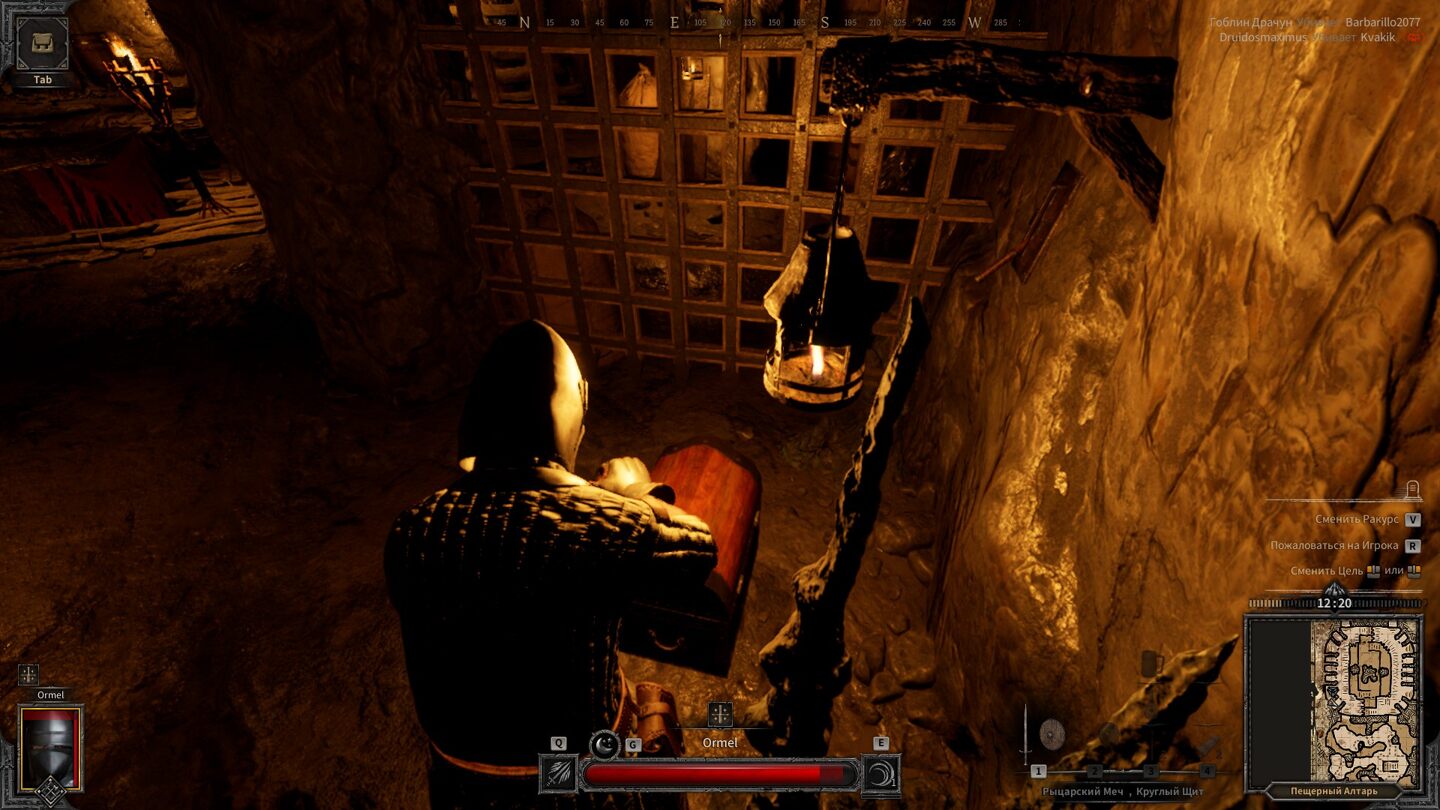
But here, as they say, there is a nuance. You must trust your partners 100% - both in terms of playing skill and integrity. What if someone from your team will want to kill the others and take the treasure for themselves? Or will run away in a moment of danger, leaving your friend to his fate? In a way, it's easier for a loner to settle in Dark and Darker. At least it is immediately clear that everyone around is an enemy. You don't have to share your loot with anyone, and there's no need to wait for your friend to join the session either. You choose where to go, what chest to open and who to fight. Besides, the atmosphere of the game is better felt in solo - tombs with walking corpses and insect monsters cause genuine fear, and learning from your own mistakes is more effective than walking under jokes and mutual reproaches.
How does the pumping work?
Don't forget that Dark and Darker is, among other things, a role-playing game in the classic fantasy setting. That is, the heroes have a lot of characteristics, from the usual strength, agility, resistance, knowledge and health to such exotics as manual dexterity (necessary for the speed of opening locks), speed of reading spells and duration of all negative effects. Each of these items can be improved both through equipment and by gaining new levels. The latter are unlocked for experience from killing enemies, collecting trophies, completing NPC quests - in general, for any success during dungeons.
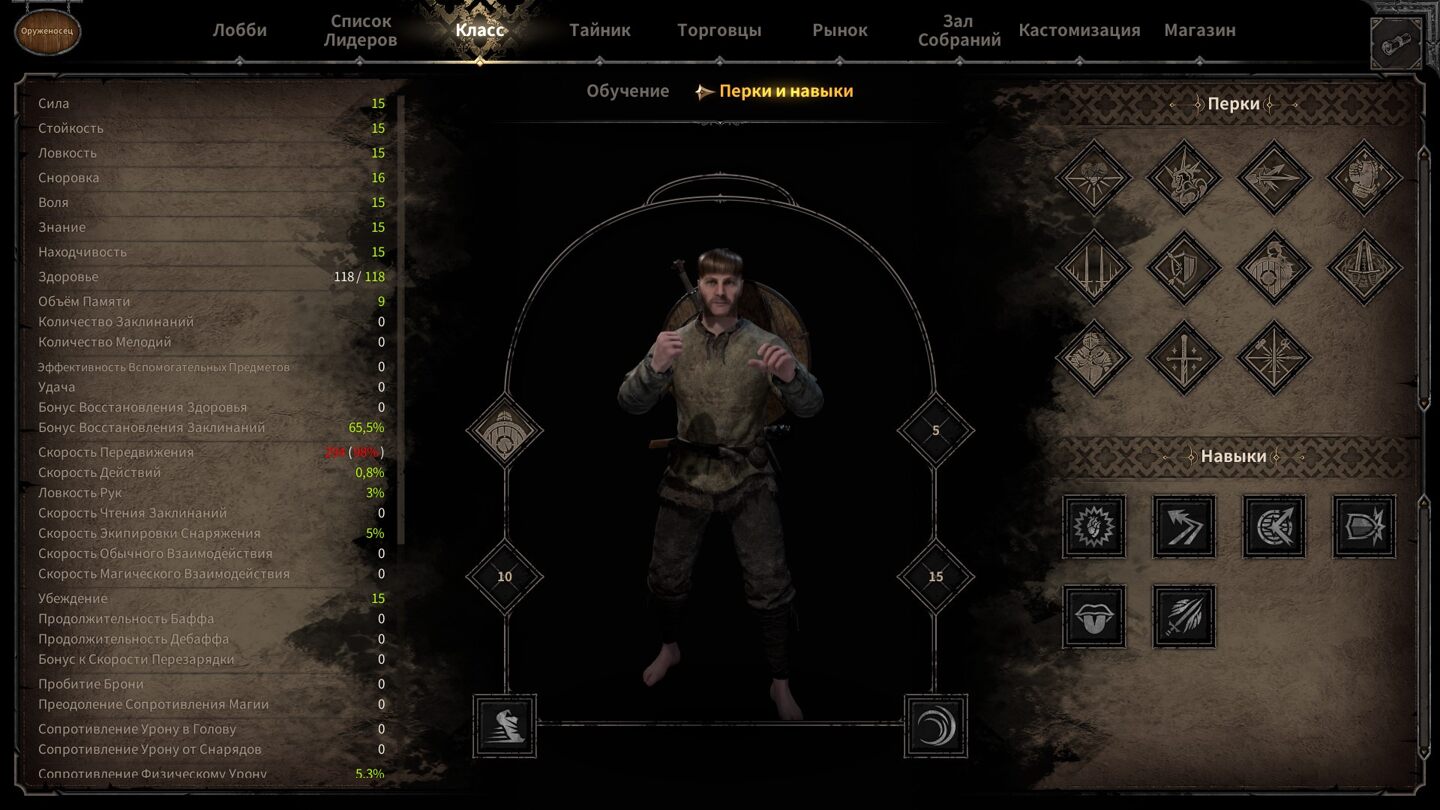
Also, increasing in levels allows you to unlock additional skills (perks). At the first level your character has only one perk, at the fifth level - two, at the tenth - three, and at the fifteenth - four. Between battles you can change them as you like, adjusting your character's abilities to your equipment, the skills of other squad members and the map you're going to. Of course, the game balances matches so that newcomers don't end up in the same location as experienced gamers. But keep in mind that after level 25 the experience filter stops working - in the higher league everything depends on everyone's personal qualities. Also during the pumping it is worth considering that some fighters (for example, cleric) have two development trees - with melee and spells. This means that you should pay attention to both, otherwise your monk will lose to a wizard in magic, and to a barbarian or a warrior in swordsmanship.
Strictly for the amateur
This game can be a real test of your mettle. Prepare to enter the maze ten times - and ten times to lose all the loot along with the death of your character. This is exactly what happens to newcomers here. That's why not everyone will have enough stamina to get acquainted with Dark and Darker and comprehend all its intricacies. But those who will stay will appreciate the gloomy surroundings and thoughtfulness of details in the combat system. And for three friends the game will be a great generator of stories with role-playing. In addition, you can create a free account in it and be sure that none of your rivals will not buy an advantage for money - you won't get either upgrade points or magic armor for real currency.
Zarium. July 2024
Zarium. July 2024

